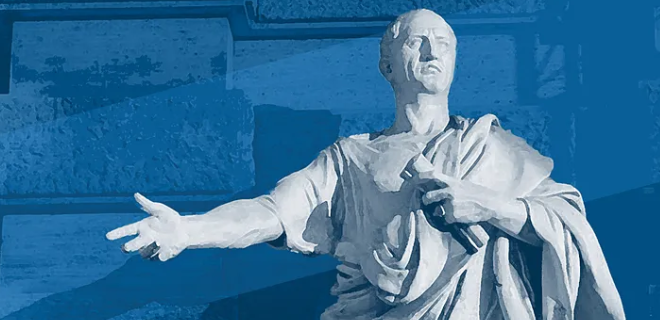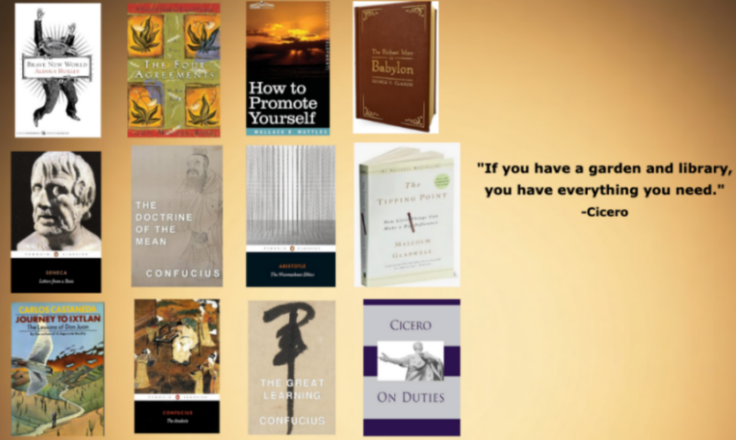What Can We Learn From This Forgotten Roman Hero

First Century BCE, it was the time when the great Rome had forgotten the honor, virtue and character that were in the blood of Roman lives for some centuries. It was the time when Rome was rife with corruption, lust of power, conspiracy, and attacks by the enemies to the Roman Republic. It was the era of the leading political figures like Julius Caesar, Pompey, Marc Antony and Octavian, all with the lust to rule the Roman state. During this trifling era, lived one of the greatest orators of the Roman Republic, Marcus Tullius Cicero (106 - 43 BC), who became the youngest citizen to attain the highest rank of consul without coming from a political family.
Cicero's Life and Works
As Rome's most famous orator, Cicero prosecuted crooked politicians and defended the attacks on Roman Republic. Amidst a violent age, Cicero was a man of peace. He refused to build a personal army like other leading Roman politicians, and he spoke out against violence. Amidst the tyranny, Cicero became famous as a brilliant, hard-working attorney who won difficult cases. One of his popular and greatest achievement was his powerful orations attacking Catiline, who was making conspiracy to attack Rome, which made senate go against the Cataline who was killed later. The great orator mesmerized the Senate with these opening lines and the blistering indictment that followed:
How long, O Catiline, will you abuse our patience? And for how long will that madness of yours mock us? To what end will your unbridled audacity hurl itself?
In 60 BCE, Julius Caesar wanted Cicero to join a powerful partnership that became known as the First Triumvirate, but Cicero didn't accept the offer and took the side of Pompey. But Caesar triumphed over Pompey, and then cowed the Senate into naming him dictator for life. A month later, Caesar was assassinated in the Senate by pro-republican forces. This was the time when Cicero was the highest ranking politician in the Roman Republic making him more able to defend the Rome. The wake of Caesar’s death left Cicero and Mark Antony standing as the two main powers in Rome. Cicero had the backing of the Senate, but Antony had the power of Caesar’s legacy. When Antony, the general of Caesar attempted to succeed Caesar as dictator, Cicero spearheaded the republican cause once again and delivered speeches denouncing him as a public enemy.
Cicero's Death
In 43 BCE, Antony, Octavian and Lepidus allied to form the second Triumvirate and Cicero's fate was settled. Devastated that the republican cause was now lost, Cicero withdrew from Rome. Antony and his fellow conspirators named Cicero an enemy of the state and sent soldiers to assassinate Cicero. They murdered Cicero and cut his right hand and beheaded him and sent it to Antony. According to historian, before his murder Cicero said: "There is nothing proper about what you are doing, soldier, but do try to kill me properly.”
In the orders of Antony, Cicero’s hands were severed and nailed along with his head to the speaker’s platform in the Roman Forum. Antony’s wife personally pulled out Cicero’s tongue, and in a rage against his oratory, stabbed it repeatedly with her hairpin. This shows how he was vehemently hated by this enemies. Century after his death, the Roman writer Quintilian declared that Cicero was “the name not of a man but of eloquence itself.”
Cicero's Legacy
Cicero, the greatest orators of the Roman Republic, urged reason, decency, peace, and liberty, was the man behind the foundation of modern world. United States of America, one of the world's greatest modern day Republic, was founded on the acts of Cicero's life and teachings. Thomas Jefferson and John Adams were impressed and inspired by Cicero as his words echoes in the Declaration of independence. The Roman Republic inspired America's founding members to organize three part government: Legislative, Judicial and Executive all operating under the rule of law. Even the title given to George Washington "the father of our country" was a translation of "Pater Patriae," the title given to Cicero.
Thirteen centuries later, when the printing press was invented, the first book it produced was the "Gutenberg Bible", but the second was Cicero’s "De Officiis" (On duties). Inspired by Cicero's life and works, Thomas Jefferson called Cicero “the first master of the world.” And John Adams proclaimed, “All the ages of the world have not produced a greater statesman and philosopher” than Marcus Tullius Cicero. In "De Officiis," he wrote:
"The chief purpose in the establishment of states and constitutional orders was that individual property rights might be secured . . . it is the peculiar function of state and city to guarantee to every man the free and undisturbed control of his own property. Again: The men who administer public affairs must first of all see that everyone holds onto what is his, and that private men are never deprived of their goods by public men."
Cicero, De Officiis
How can we forget the greatness and the legacy of this man in this modern world where the public right has been threatened and world is dealing with the wars and political rivalry between nations? It is during this time we have to remember this forgotten Roman hero, from whom the modern world was founded. Even you have never heard of him, we all have probably heard his word: Ægroto dum anima est, spes est. which translates, where there is life, there is hope. Cicero, who once discovered the forgotten tomb of the great Archimedes knew the importance of remembering the past. "To be ignorant of what happened before you were born, he said, "is to remain forever a child,"
Here are some important Lessons from Cicero.



Leave a Reply
You must be logged in to post a comment.